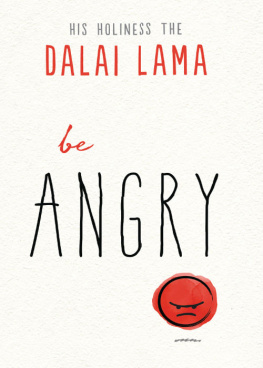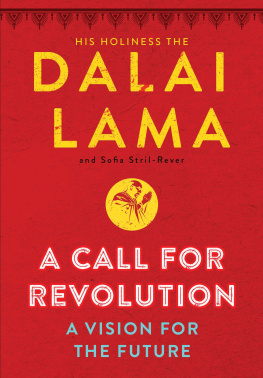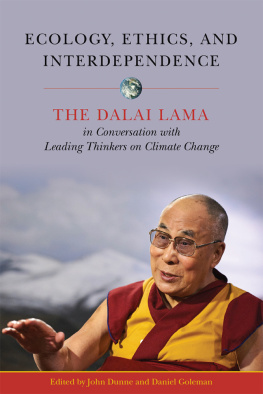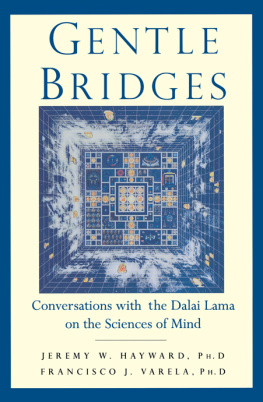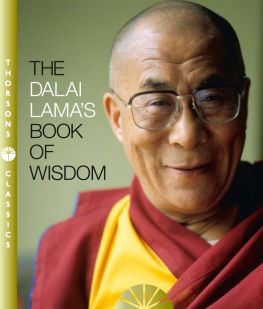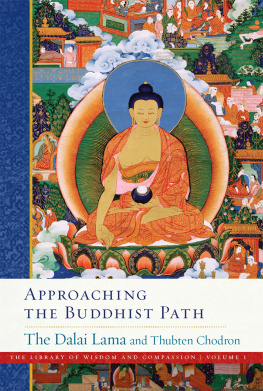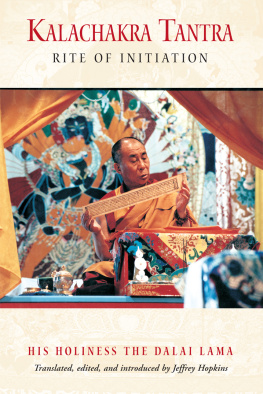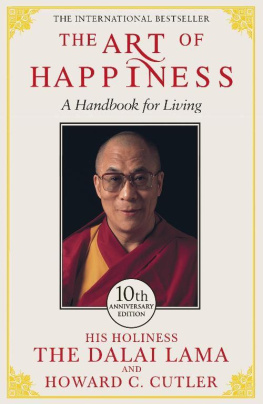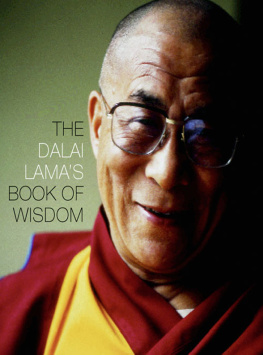Lama Dalai - Be Angry
Here you can read online Lama Dalai - Be Angry full text of the book (entire story) in english for free. Download pdf and epub, get meaning, cover and reviews about this ebook. year: 2019;2013, publisher: Hampton Roads Publishing, genre: Politics. Description of the work, (preface) as well as reviews are available. Best literature library LitArk.com created for fans of good reading and offers a wide selection of genres:
Romance novel
Science fiction
Adventure
Detective
Science
History
Home and family
Prose
Art
Politics
Computer
Non-fiction
Religion
Business
Children
Humor
Choose a favorite category and find really read worthwhile books. Enjoy immersion in the world of imagination, feel the emotions of the characters or learn something new for yourself, make an fascinating discovery.
- Book:Be Angry
- Author:
- Publisher:Hampton Roads Publishing
- Genre:
- Year:2019;2013
- Rating:4 / 5
- Favourites:Add to favourites
- Your mark:
- 80
- 1
- 2
- 3
- 4
- 5
Be Angry: summary, description and annotation
We offer to read an annotation, description, summary or preface (depends on what the author of the book "Be Angry" wrote himself). If you haven't found the necessary information about the book — write in the comments, we will try to find it.
Be Angry — read online for free the complete book (whole text) full work
Below is the text of the book, divided by pages. System saving the place of the last page read, allows you to conveniently read the book "Be Angry" online for free, without having to search again every time where you left off. Put a bookmark, and you can go to the page where you finished reading at any time.
Font size:
Interval:
Bookmark:

Copyright 2019 Noriyuki Ueda
All rights reserved. No part of this publication may be
reproduced or transmitted in any form or by any means,
electronic or mechanical, including photocopying, recording,
or by any information storage and retrieval system, without
permission in writing from Hampton Roads Publishing, Inc.
Reviewers may quote brief passages. Material for this edition
previously appeared in The Dalai Lama on What Matters Most,
Hampton Roads Publishing, 2013, ISBN 978-1-57174-701-3.
Hampton Roads Publishing Company, Inc.
Charlottesville, VA 22906
Distributed by Red Wheel/Weiser, LLC
www.redwheelweiser.com
Sign up for our newsletter and special offers by going to
www.redwheelweiser.com/newsletter
Graphic image of the Dalai Lama from www.vectorportal.com
ISBN: 978-1-64297-007-4
Library of Congress Cataloging-in-Publication Data
available upon request.
Printed in Canada
FR
10 9 8 7 6 5 4 3 2 1

It seems antithetical to use angry and Dalai Lama in the same sentence, much less the same book. After all, the Dalai Lama's lifelong teaching is about the cultivation of love and compassion. But however much the Dalai Lama has to say about avoiding anger, he also recognizes that it is an inevitable part of the human condition. The Dalai Lama has observed: Generally speaking, if a human being never shows anger, then I think something's wrong. He's not right in the brain.
Anger that is unrecognized and suppressed will destroy us from the inside out. But there is such a thing as wrathful compassionan anger that is used not for one's own selfrighteousness but rather seeks to protect others from harm.
In today's world, there is a lot to be angry about: injustice, social and economic inequality, racism, ignorance.
This little book is here to tell you: Be angry.
Once we can recognize angerhow we hold it, how we manifest it, how we act upon itthen we can transform that anger to compassionate action. Only then can we bring love, peace, and healing to the world.
This book was compiled from an interview with the Dalai Lama conducted by Noriyuki Ueda, a well-known Japanese author, lecturer, and cultural anthropologist. As a visiting research fellow at the Center for Buddhist Studies at Stanford University, he taught a twenty-part lecture series on contemporary Buddhism during which his students questioned him: Can buddhism respond to contemporary problems?
His interview with the Dalai Lama provides insight into the answer.
I n the real world, exploitation exists, and there is a great and unjust gap between rich and poor. The question is, from a Buddhist perspective, how should we deal with inequality and social injustice? Is it un-Buddhist to feel anger and indignation in the midst of such circumstances?
This is an interesting question. Let's begin by looking at the matter first from a secular point of vieweducation. What do we teach about anger?
I often say we should have more serious discussion and research about whether or not our so-called modern education system is adequate enough to develop a healthier society.
Some American scientists I know are seriously concerned about social problems. Over the years, we have had many discussions about the value of compassion, and several of these scientists conducted an experiment with university students.
For a period of two to three weeks, they had the students practice attentive, deliberate meditation (mindfulness), and after the two or three weeks of meditation, the scientists investigated what changes had taken place in their subjects. They reported that after this period of meditation practice, the students became calmer, had greater mental acuity and less stress, and had increased power of memory.
The University of British Columbia in Canada has created a new institution that is conducting research on how to cultivate warmheartedness in students within the modern educational system. At least four or five universities in the United States are acknowledging that modern education lacks something in this regard.
Research is finally being conducted to address this problem and propose ways to improve the system.
Unless there is a worldwide movement to improve education and give more attention to ethics, this work will take a very long time, and it will be very difficult.
Of course, in Russia and China the same dangers exist, and in India, too. India may be a little better off because of its heritage of traditional spiritual values, even if they probably do not think about this question in terms of logic or reason.
Japan is a modernized country and therefore Westernized, so Western problems are also occurring in Japan. With the adoption of a modern educational system, traditional values and family values have suffered. In the West, the power of the Church and its support for the family has declined, and society has suffered the consequences. In Japan, too, the influence of religious institutions has faded, and with it, families have suffered.
Now let's talk about what role religious people can play in solving social problems. All religious institutions have the same basic valuescompassion, love, forgiveness, tolerance. They express and cultivate these values in different ways. And religions that accept the existence of God take a different approach from those, like Buddhism, that don't. The current pope is a very sophisticated theologian, and though he is a religious leader, he emphasizes that faith and reason must coexist.
Religion based on faith alone can end up as mysticism, but reason gives faith a foundation and makes it relevant in daily life.
In Buddhism, from the start, faith and reason must always go together. Without reason, it is just blind faith, which the Buddha rejected. Our faith must be based on the Buddha's teachings.
The Buddha first taught the Four Noble Truths, the basis of all Buddhist doctrine, according to which the law of cause and effect governs all things.
He rejected the idea of a god as creator of all things. Buddhism begins with the logical understanding that all happiness and suffering arises from specific causes. So Buddhism is rational from the start, particularly the schools of Buddhism based on the Sanskrit tradition, including Japanese Buddhismthat is, the Buddhism that carries on the great Nalanda University tradition from ancient India.
BUDDHISM BEGINS WITH THE LOGICAL
UNDERSTANDING THAT ALL HAPPINESS
AND SUFFERING ARISES FROM
SPECIFIC CAUSES.
According to the Nalanda tradition, everything should be understood according to reason. We must first be skeptical and doubt everything, as we do in the modern world. Skepticism produces questions, questions lead to investigation, and investigation and experimentation bring answers.
Buddhists do not believe the teachings of the Buddha merely because he expounded them. We approach the teachings with a skeptical attitude, and then we investigate whether they are true. Once we know that a teaching is truly correct, then we can accept it.
Buddhist teachings are not mere mysticism; they are based on reason.
Japanese Buddhism has diverged considerably from that reason-based approach. For example, in Zen Buddhism, the goal is to transcend verbal logic. In the Nembutsu faith [of the Pure Land sects], the goal is to entrust ourselves completely to the saving power of Amida Buddha.
Next pageFont size:
Interval:
Bookmark:
Similar books «Be Angry»
Look at similar books to Be Angry. We have selected literature similar in name and meaning in the hope of providing readers with more options to find new, interesting, not yet read works.
Discussion, reviews of the book Be Angry and just readers' own opinions. Leave your comments, write what you think about the work, its meaning or the main characters. Specify what exactly you liked and what you didn't like, and why you think so.

